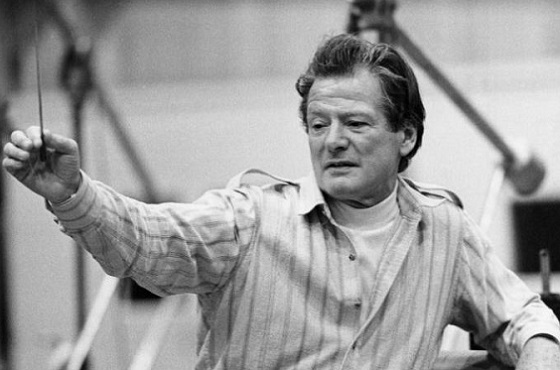
Sir Neville Marriner. Photo Credit: Rex Features (via The Telegraph).
Working in and around recorded classical music has its rewards. It also takes on a deeply personal angle when one of its luminaries passes. Such is the case with the death of Sir Neville Marriner, who has died at 92.
As far back as I can remember, Neville Marriner’s recordings have been a staple in my own private collection of music. I think I’m lucky to have come of age during the CD era, when so much of his artistry was brought forth, no doubt because the many recording labels he worked for over the years made hay while the sun shone. In the late 1980s and into the 1990s, you could hardly turn around in a CD store or radio station library without bumping into one of his recordings.
For many, Marriner was their introduction to the music of Mozart. At the time of the film Amadeus’ release, Marriner was already quite a known quantity to legions of classical music listeners – both in recorded media as well as through radio – but with a film of such wide-spread appeal, he unwittingly became a silent partner in bringing Mozart’s music to a decidedly wider audience. In fact, the film’s soundtrack sold more than 6.5 MILLION copies. The choice of Marriner to conduct the soundtrack was couched best in terms only the cleverest of marketers could bring to bear, with a cheeky admonition that “Only two people were qualified to conduct the score,” the words atop pictures of Mozart and Marriner. “One was unavailable” rounded out the ad campaign.
Fittingly so.
As someone who has spent his career programming classical music for radio audiences, I can say that, without Sir Neville, our world would be a different one. In the world of Karajan, Carlos Kleiber, Toscanini, and Bernstein, Marriner’s was a household name, and yet, unlike his sometimes more showy brethren, his many fans knew nothing more of him than his likeness from album covers. His personality, such as it was, lent itself more to music making - and bringing classical music to a greater audience - than serving to further a personal agenda. He knew his way around an orchestra, and in an age when conductors became as specialized in period performances and composers as doctors and lawyers have specialties in this or that area of practice, Marriner was comfortable swimming in a diverse pool of classical music waters. Whether Bach or Handel, Mozart or Haydn, Tchaikovsky or Massenet, above all he knew – and loved – music-making. His recordings serve as the solid bedrock for many classical broadcasters’ libraries. His gentle, no-nonsense personality and approach made that possible with sometimes extraordinary results.
Before I got into radio, I was in the business of managing shops that sold classical recordings, and one of my major duties was advising the buying public on what recordings they should add to their libraries. If I had a dollar for every time I recommended a Marriner recording to someone, or better yet, announced his name with programming, I would probably be lighting my charcoal grill with twenties.
“Simply put,” I would tell my customers, “you will never go wrong with Sir Neville Marriner.”
The same holds true, to this day.